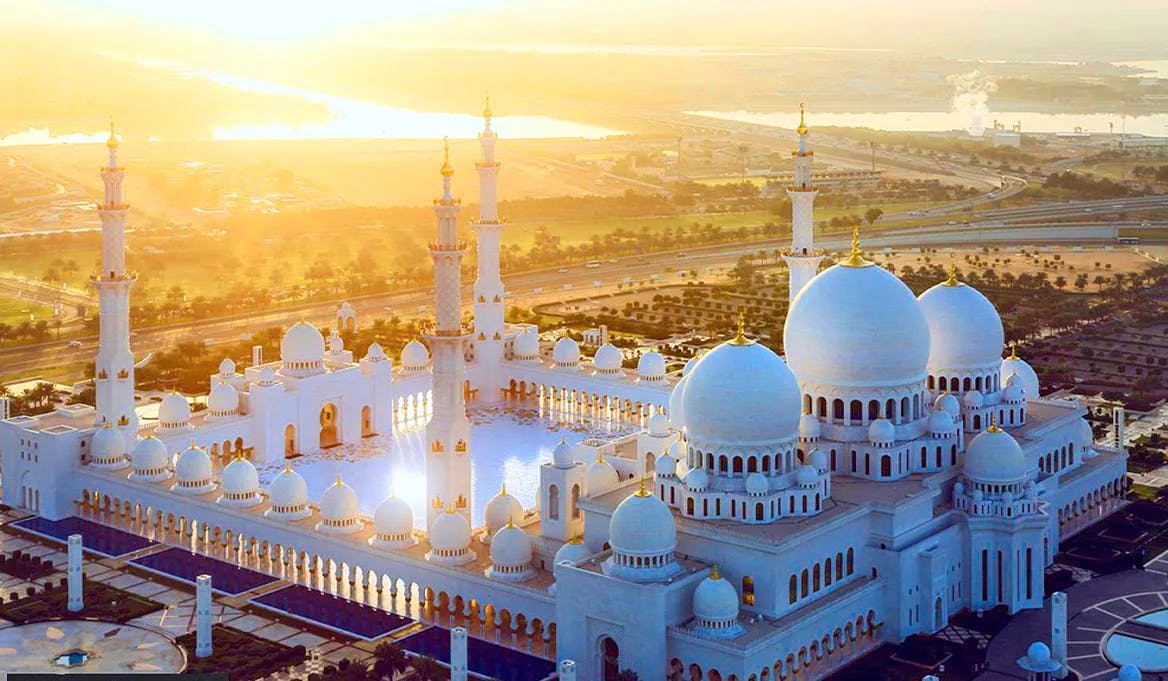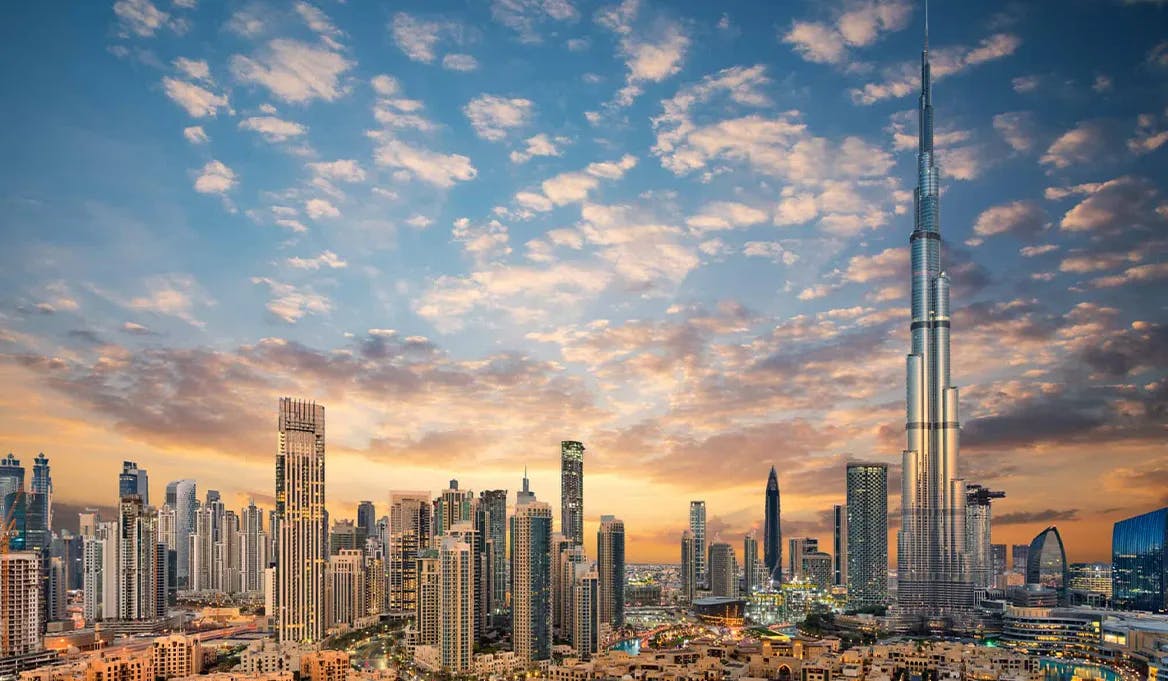
From Ancient Roots to Modern Wonders: The Evolution of UAE Architecture and Design
Aug 12, 2024
7 minutes read
The United Arab Emirates (UAE) has dramatically transformed from a modest assemblage of desert settlements to the forefront of architectural innovation. The progression of UAE architecture and design has been directly linked to its rich artistic heritage, fast modernization, and futuristic worldview. Abu Dhabi architecture exemplifies this metamorphosis, blending traditional Islamic influences with slice-edge designs that review civic geographies. This composition examines the evolution of architectural masterpieces in the UAE, from the earliest to the most ultramodern, demonstrating how the area has maintained its identity while also integrating futuristic designs.

Historical Context: The Foundations of UAE Architecture
Traditional Architecture: The Early Days
The architectural history of the UAE stems from the Bedouin culture, which has influenced the architecture in the UAE with traditional houses made of win fronds (Arish) and slush-slip (Barasti). These structures were simple to construct yet largely effective, designed to repel the harsh desert climate.
The Influence of Islamic Architecture
The crucial principle underlying the UAE's architectural style is Islamic design, characterized by geometrical motifs, as well as the addition of poles and bends. Kirk, souks, and castles are bones that belong to the Islamic period, serving as a testament to the rich heritage of the UAE. Over time, ultramodern architecture in Dubai has seamlessly blended these traditional rudiments with innovative designs, creating a skyline that reflects both artistic heritage and futuristic vision.
The Pearl Trade Era
During the late 19th and early 20th centuries, the plum trade brought wealth to the region. With this profitable bubble, numerous rich men got the chance to erect their houses and structures, showcasing the fineness of Emirati architecture. These structures became more elaborate, frequently incorporating wind halls (Barjeels), a distinctive feature that naturally cools the interior while reflecting the region's architectural imagination.
The Dawn of Modern Architecture: Post-Oil Boom
The Oil Boom and Urbanization
The UAE entered a new era in the 1960s by exporting and dealing in oil painting products, initiating the oil painting boom. The surge in the budget led to rapid urbanization, transforming previously known places into vibrant metropolises. Still, as ultramodern structures rose, studies to describe traditional desert architecture, focusing on eco-friendly features and their functions in the UAE, became essential in conserving heritage. Ways similar to wind halls (Barjeel) for natural cooling, thick slush-slip-up walls for sequestration, and yards for ventilation highlight how once designs prioritized sustainability in an extreme climate.
The Rise of Dubai and Abu Dhabi
The monumental ascent of both Dubai and Abu Dhabi to the world's architectural stage was notable. Towers have taken over the megacity, creating a perfect blend of traditional Islamic art and modern fustiness. Amid this rapid transformation, conventional houses in the UAE continue to hold artistic significance, reflecting the region's rich heritage through their wind towers, courtyards, and intricate designs.
The Impact of Globalization
Globalization encouraged transnational engineers to come to the UAE, resulting in an atmosphere where different styles collided. It was the time when systems like the structure of the Burj Al Arab, which indicated Dubai's ambition of luxury, were executed. Despite these ultramodern influences, the traditional armature of the UAE remained a crucial element, with elements like wind towers, courtyards, and intricate geometric designs blending seamlessly into contemporary structures.
Key Principles of Modern UAE Architecture
Sustainability and Environmental Considerations
Architecture in the ultramodern UAE earns a high mark for sustainability by creating structures that consume less energy. Structures like Masdar City of Abu Dhabi are the stylish illustrations of the country's commitment to environmentally friendly design. Also, the architecture of new apartments or estates being constructed is worth witnessing.
Innovation and Futurism
The UAE names architectural inventions and are frequently seen as long-distance runners of challenges. UAE armature is a testament to visionary design, blending ultramodern engineering with artistic heritage. The Burj Khalifa, the tallest structure in the world, is one of the stylish exemplifications of the sense of their forward-looking approach.
Cultural Preservation Amidst Modernization
Despite the UAE's significant modernization, its culture has flourished further than ever. Contemporary designs generally integrate traditional traits, serving as a testament that the country isn't only ultramodern but also significant.
Methodologies and Tools: The Craft Behind the Creations
Use of Advanced Technologies
Ultramodern styles, such as Building Information Modeling (BIM) and 3D printing, have had a profound impact on the construction sector, particularly in the UAE, enabling more intricate and accurate designs. Indeed, the technologies being used in Dubai's shorefront parcels are to die for.
Collaborative Design Approaches
Engineers and masterminds in the UAE prefer the traditional system of cohesive collaboration, ensuring the aesthetic and structural aspects of the design are well laid out. This multidisciplinary approach has resulted in some of the most distinctive structures in the world.
Innovations in Construction Techniques
The UAE, in particular, has taken innovative measures in the construction process, for instance, by introducing new construction styles for similar structures, such as towers. Through the use of high-strength concrete and advances in cooling systems, we're seeing this technology implemented globally, particularly in ambitious systems led.
Challenges and Solutions in UAE Architecture
Navigating Harsh Climatic Conditions
The UAE desert terrain is notoriously harsh on engineers. Brilliant results similar to wind halls, clear glass, and sun-blocking technologies can be made to combat the heat swells in the regions with or of ferocious solar radiation.
Balancing Tradition with Modernity
The issue in the UAE of conserving traditional architectural design while still creating ultramodern structures is ongoing. Nonetheless, the country has successfully invested its artistic heritage into ultramodern establishments.

Managing Rapid Urbanization
Urbanization in the UAE has occurred at a breakneck pace, and as a result, it has constantly put a burden on civic planning, with the main question being how rapid growth can be made sustainable. Both Dubai and Abu Dhabi are making good progress in planning civic spaces that are responsive to similar challenges, with a focus on sustainability over the long term.
Future Trends: What Lies Ahead?
Smart Cities and Technological Integration
Dubai's Smart City action is among the UAE's most outstanding intelligent megacity systems. These are metropolises designed to be highly connected, with a variety of other systems intertwined through IT, resulting in exceptional living conditions for their citizens.
Continued Focus on Sustainability
Sustainability will continue to play a significant part in the UAE armature. The prospective creation of the greenest structures is anticipated, and the Emirates will stand out as the most sustainable place in the whole world.
Cultural Revival in Modern Designs
It's an ongoing trend in the field to revive the old ideas of erecting metropolises, which were original and still represent the megacity. It has been predicted that this artistic movement will be the backbone of the UAE's architecture, ensuring that the country's heritage is well-maintained while also creating innovative structures.
Case Studies: Iconic Structures in the UAE
The Burj Khalifa: A Pinnacle of Innovation
The Burj Khalifa, which is 828 meters high, isn't just the world's tallest structure but also evidence of the ambition and ingenuity of Dubai. The new hideous, that's further Islamic than anything different, is the Burj Khalifa hutment, which is erected in the town of Dubai near the Arabian Gulf ocean, where it takes schematic shapes thanks to its Y-shaped bottom design.
The Sheikh Zayed Grand Mosque: A Blend of Cultures
The Grand Mosque in Abu Dhabi, located at the heart of Sheikh Zayed, showcases stylish modern architecture. It's a representative place that unites the stylish from both the original and the new age. The synagogue, with its striking white marble façade and complex interior designs, is one of the most sought-after sightseeing destinations in the UAE.
The Louvre Abu Dhabi: A Cultural Icon
The Louvre Abu Dhabi is the UAE's way of proving its fidelity to the preservation of its own culture and global collaboration. Jean Nouvel, who created it, requested the incorporation of a large pate that deflects the sun in a manner that mimics the traditional Arabian mashrabiya.
Expert Opinions: Insights from Architectural Leaders
The Role of Architecture in the UAE's Global Image
According to architectural experts, the UAE's commitment to innovation and design has been a key factor in shaping the country's global image. The country's unique style of combining old and new technologies has made it a leader in the field of armature.
Sustainability as a Driving Force
Also, sustainability is another aspect of the UAE armature that experts emphasize. The UAE, as the world is shifting towards greener practices, is a leader in incorporating sustainable design into its civic planning.
Conclusion
The UAE has witnessed a pivotal era marked by revolutions, inventions, and the making of history. The country has straddled its literal geographies and ultramodern masterpieces well, managing to keep pace with fast technological developments while still conserving its artistic heritage. As it looks towards the future, the UAE's architectural landscape will also reflect its aspirations, values, and character.
1. What are the traditional architectural styles of the UAE?
Traditional Emirati architecture includes barasti (palm frond) houses, mud-brick homes, and wind towers designed for natural cooling.
2. How has modern architecture transformed the UAE?
Modern designs have introduced iconic skyscrapers, sustainable projects, and futuristic structures, such as the Burj Khalifa and the Museum of the Future.
3. What role does sustainability play in UAE architecture today?
Sustainability is central, with many projects focusing on green building certifications, renewable energy, and eco-friendly materials.
4. How does UAE architecture blend tradition with innovation?
Many modern buildings incorporate traditional motifs, Islamic design patterns, and cultural elements into contemporary structures.
5. What are the most iconic architectural landmarks in the UAE?
Notable landmarks include Burj Khalifa, Sheikh Zayed Grand Mosque, Palm Jumeirah, Louvre Abu Dhabi, and the Museum of the Future.



